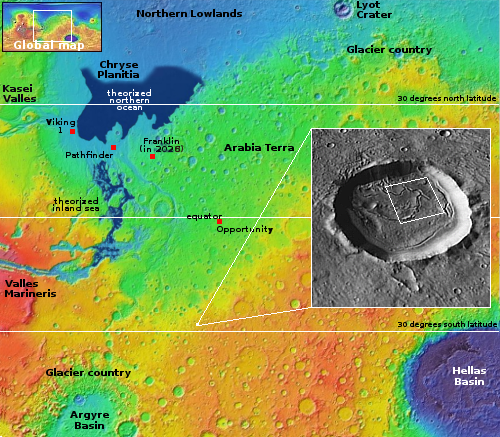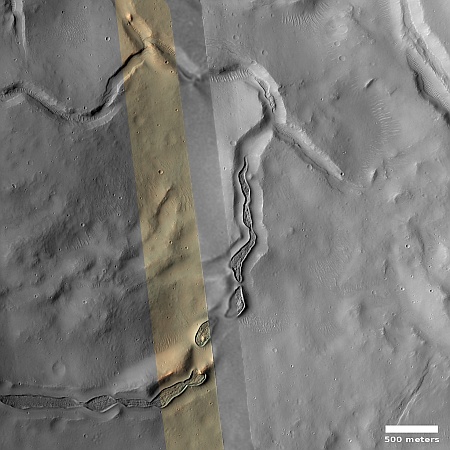Bursting bubbles of water gas on Mars
Cool image time! The picture to the right, cropped, reduced, and enhanced to post here, was taken on January 12, 2024 by the high resolution camera on Mars Reconnaissance Orbiter (MRO). Because of a technical issue that leaves a blank strip down the center of recent high-res MRO images, I have filled in that gap using a MRO context camera photo taken on January 12, 2015. The resolution is much less, but by doing so we can see the ground features as a unit.
What are we looking at? According to the scientists, this picture shows “fresh-looking ruptures,” referring to the broken line of sharp tears inside that meandering canyon that almost resemble a fresh wound in flesh. As this location is at 28 degrees south latitude, it lies on the edge of dry equatorial regions, where orbital images have sometimes found hints of a few remaining buried glaciers that are much more common closer to the poles.
In this case it appears the warmer equatorial climate has acted to heat up the buried ice so that it sublimated into gas. At some point the gas pressure caused the surface to burst, much like bubbles bursting on the surface of a pot of simmering tomato sauce, leaving behind these scars.

The white dot on the overview map to the right marks this location. These ruptures are located on the floor of a 6.5-mile-wide unnamed crater in the southern cratered highlands, as indicated by the rectangle in the inset.
Many craters found in the mid-latitudes of Mars contain what appears to be glacial debris. This crater, as well as several nearby, all appear to have retained some glacial material despite being closer to the poles, possibly because of their higher colder altitude. Nonetheless, these craters all have similar ruptures, suggesting that the strong equatorial sunlight is slowly acting to cause that ice to sublimate and escape.
Eventually, the ice in these craters will disappear entirely, leaving behind a dry crater with some features typically left behind by past glacial activity.
On Christmas Eve 1968 three Americans became the first humans to visit another world. What they did to celebrate was unexpected and profound, and will be remembered throughout all human history. Genesis: the Story of Apollo 8, Robert Zimmerman's classic history of humanity's first journey to another world, tells that story, and it is now available as both an ebook and an audiobook, both with a foreword by Valerie Anders and a new introduction by Robert Zimmerman.
The print edition can be purchased at Amazon or from any other book seller. If you want an autographed copy the price is $60 for the hardback and $45 for the paperback, plus $8 shipping for each. Go here for purchasing details. The ebook is available everywhere for $5.99 (before discount) at amazon, or direct from my ebook publisher, ebookit. If you buy it from ebookit you don't support the big tech companies and the author gets a bigger cut much sooner.
The audiobook is also available at all these vendors, and is also free with a 30-day trial membership to Audible.
"Not simply about one mission, [Genesis] is also the history of America's quest for the moon... Zimmerman has done a masterful job of tying disparate events together into a solid account of one of America's greatest human triumphs."--San Antonio Express-News
Cool image time! The picture to the right, cropped, reduced, and enhanced to post here, was taken on January 12, 2024 by the high resolution camera on Mars Reconnaissance Orbiter (MRO). Because of a technical issue that leaves a blank strip down the center of recent high-res MRO images, I have filled in that gap using a MRO context camera photo taken on January 12, 2015. The resolution is much less, but by doing so we can see the ground features as a unit.
What are we looking at? According to the scientists, this picture shows “fresh-looking ruptures,” referring to the broken line of sharp tears inside that meandering canyon that almost resemble a fresh wound in flesh. As this location is at 28 degrees south latitude, it lies on the edge of dry equatorial regions, where orbital images have sometimes found hints of a few remaining buried glaciers that are much more common closer to the poles.
In this case it appears the warmer equatorial climate has acted to heat up the buried ice so that it sublimated into gas. At some point the gas pressure caused the surface to burst, much like bubbles bursting on the surface of a pot of simmering tomato sauce, leaving behind these scars.

The white dot on the overview map to the right marks this location. These ruptures are located on the floor of a 6.5-mile-wide unnamed crater in the southern cratered highlands, as indicated by the rectangle in the inset.
Many craters found in the mid-latitudes of Mars contain what appears to be glacial debris. This crater, as well as several nearby, all appear to have retained some glacial material despite being closer to the poles, possibly because of their higher colder altitude. Nonetheless, these craters all have similar ruptures, suggesting that the strong equatorial sunlight is slowly acting to cause that ice to sublimate and escape.
Eventually, the ice in these craters will disappear entirely, leaving behind a dry crater with some features typically left behind by past glacial activity.
On Christmas Eve 1968 three Americans became the first humans to visit another world. What they did to celebrate was unexpected and profound, and will be remembered throughout all human history. Genesis: the Story of Apollo 8, Robert Zimmerman's classic history of humanity's first journey to another world, tells that story, and it is now available as both an ebook and an audiobook, both with a foreword by Valerie Anders and a new introduction by Robert Zimmerman.
The print edition can be purchased at Amazon or from any other book seller. If you want an autographed copy the price is $60 for the hardback and $45 for the paperback, plus $8 shipping for each. Go here for purchasing details. The ebook is available everywhere for $5.99 (before discount) at amazon, or direct from my ebook publisher, ebookit. If you buy it from ebookit you don't support the big tech companies and the author gets a bigger cut much sooner.
The audiobook is also available at all these vendors, and is also free with a 30-day trial membership to Audible.
"Not simply about one mission, [Genesis] is also the history of America's quest for the moon... Zimmerman has done a masterful job of tying disparate events together into a solid account of one of America's greatest human triumphs."--San Antonio Express-News


